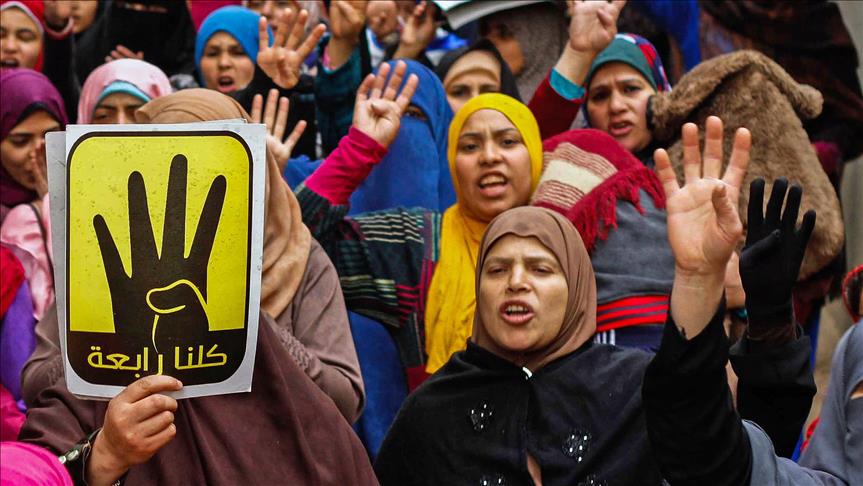Egypt sees scattered protests on 5th uprising anniversary
Despite unprecedented security clampdown, Egypt sees number of limited protests on fifth anniversary of popular uprising that brought down Mubarak regime in 2011
 Photo: Heshamy Fath/AA
Photo: Heshamy Fath/AA
Egypt
CAIRO
Several Egyptian governorates saw limited anti-regime protests on Monday to mark the fifth anniversary of the January 25, 2011 uprising that toppled autocratic President Hosni Mubarak after 30 years in power.
According to Anadolu Agency correspondents, activists organized protests in several Egyptian provinces amid unprecedented security measures imposed by the military countrywide.
In Sharqiya province in the northern Nile Delta, demonstrations were organized in a handful of cities in which supporters of former President Mohamed Morsi -- ousted in a 2013 military coup -- waved Egyptian flags and shouted anti-regime slogans.
In the northern Behaira province, meanwhile, protesters staged demonstrations in the city of Damanhour.
In the Menoufiya province in the northern Nile Delta, demonstrators in the city of Tala chanted, "I say to my brother in prison: your captivity is liberating our homeland. Revolution, revolution everywhere."
Dakahliya in the northern Nile Delta, meanwhile, saw several demonstrations held in the early hours of Monday, in which demonstrators raised banners bearing the images and names of political detainees and photos of the revolution’s "martyrs".
Small rallies were also seen in the southern Minya province, where dozens of protesters formed two human chains.
In Egypt’s coastal Alexandria district, demonstrations were organized in 12 different districts by Egypt’s "Anti-Coup Alliance" under the slogan "The revolution is in the square".
In the city of Alexandria, meanwhile, protesters staged limited rallies in several areas, including Amiriya, Burj al-Arab, Abu Suleiman, Sidi Bishr and Montazah.
In Nile Delta province of Sharqiya, demonstrations were organized in Darb Najm and the villages of Hafna and Sndanhor, in which protesters demanded the overthrow of Egypt’s military-backed regime.
Protesters raised flags bearing the four-finger Rabaa symbol (which commemorates hundreds of demonstrators killed by security forces following the 2013 military coup) and pictures of Morsi, Egypt’ first freely-elected president and a leader of the now-outlawed Muslim Brotherhood group.
They demanded Morsi’s reinstatement as president and shouted slogans against the army, police and ruling regime.
Egyptian capital Cairo, meanwhile, was largely quiet amid heavy deployments by security forces.
A number of pro-government demonstrators gathered near Tahrir Square -- the epicenter of the 2011 uprising -- carrying Egyptian flags and chanting pro-army slogans, according to an Anadolu Agency correspondent.
Security forces have sealed Tahrir Square from all sides and closed the streets leading to the Interior Ministry in downtown Cairo.
Security forces have also been heavily deployed around Cairo’s Radio and Television building, which in the past had been the venue of major rallies.
Egypt’s now-outlawed Muslim Brotherhood group -- of which Morsi (who remains in prison) was a leading member -- has called for anti-regime protests and rallies on Monday to mark the passage of five years since the January 25 uprising.
"A new wave of protests will revive the spirit of the revolution, which seeks the overthrow of the criminal gang that now runs the country," the Brotherhood said in a statement published on its official website.
The April 6 youth movement, for its part, which had played a leading role in the 2011 uprising, announced Sunday evening that it would not take part in planned demonstrations.
The Interior Ministry stated last week that it was ready to confront "any contingency" that might occur on the uprising’s anniversary.
In January and February of 2011, Egyptians took to the streets in massive numbers to protest corruption and police brutality under the regime of autocratic President Hosni Mubarak.
After 18 days of unabated protests, Mubarak was forced to step down and hand power over to the army.
One year later, Egyptians elected Morsi -- a Muslim Brotherhood leader -- in the country's first-ever free presidential election.
The military, however, deposed Morsi after one year in office following protests against his administration.
Ever since, the Egyptian authorities have launched a relentless crackdown on the Brotherhood and Morsi’s supporters, killing hundreds and arresting tens of thousands.
In late 2013, the government designated the Brotherhood a "terrorist organization", accusing it of carrying out attacks against Egyptian security forces. The Brotherhood, for its part, insists it is committed to peaceful activism with a view to reversing the 2013 military coup and reinstating Morsi as president.








